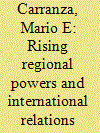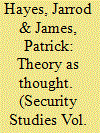|
|
|
Sort Order |
|
|
|
Items / Page
|
|
|
|
|
|
|
| Srl | Item |
| 1 |
ID:
153542


|
|
|
|
|
| Summary/Abstract |
This article explores Brazil and India's alternative paths in their search for great-power status. It examines the competing expectations of alternative IR theories regarding the conditions for great-power status in the post-Cold War era and their limited explanatory and predictive power. Although constructivism offers a more sophisticated approach, one also needs insights from realism/neorealism, neoliberal institutionalism, and globalization theory to understand the possibilities and limitations of the Brazilian and Indian strategies to be admitted to the great-power club. The article compares Brazil and India's foreign policies and nuclear diplomacy and challenges the idea that India's status as a nuclear weapon state enhances its prospects for joining the great-power club. Brazil does not possess nuclear weapons, but it has successfully created a consensual hegemonic regime in South America, which allows it to use a regionalist project (Mercosur, UNASUR) as a launching pad to gain admission to the great-power club. In contrast, despite possessing nuclear weapons, India has been unable to establish a consensual hegemonic regime in South Asia, and its “Pakistan problem” holds back her prospects for joining the great-power club. The article argues that a US blessing may not help India to gain entrance to the “board of the world” if other board members, such as China, resist India's admission. The conclusion examines the implications for IR theory of Brazil and India's alternative pathways to great-power status, and the impact of progress—or lack of progress—in global nuclear disarmament negotiations on both countries' possible admission to the great-power club.
|
|
|
|
|
|
|
|
|
|
|
|
|
|
|
|
| 2 |
ID:
132396


|
|
|
|
|
| Publication |
2014.
|
| Summary/Abstract |
Inspired by Rudra Sil and Peter Katzenstein's call for analytic eclecticism and making use of newly available, previously classified archival documents, we distill the essential logics of realism, neoliberal institutionalism, and constructivism and examine their role in shaping the debates amongst British policymakers in the context of German unification in 1989-90. We find that, although all the theoretical logics help shape the policymaking surrounding unification, none stands alone as a basis for understanding social reality. Indeed, all functioned together as British policymakers thought in terms of theory to make sense of German unification. The logic of realism clearly played an important role in shaping the perceptions of top British leadership, particularly Margaret Thatcher, of German unification as a problem. But realism did not determine the solution to the "problem." Instead, British policymakers drew on the logic embedded in neoliberal institutionalism, turning to institutions to manage the unification process. The reason for this can be found in the role of constructivist logics-particularly identity and rhetorical entrapment-that constrained British policymakers to cooperative policy options. By taking this approach, this article makes several important contributions. First, it sheds light on British policy during a critical historical moment. Second, it significantly improves understanding regarding Germany's historical and current place in Europe. Third, it ties major theoretical traditions together through a foreign policy analytical approach, and in the process suggests that many of the theoretical boundaries separating scholars are overdrawn. Finally, the article pushes international relations scholars to keep in mind the complex relationship between reality and theory. In the final analysis, bringing to bear these three perspectives highlights the complexity of the processes that produced British policy-and by extension those that shaped German unification-as well as the importance of breaking free of the strictures of the ideas versus materiality debate.
|
|
|
|
|
|
|
|
|
|
|
|
|
|
|
|
|
|
|
|
|